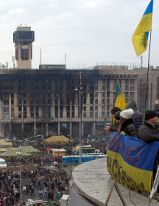As President Vladimir Putin moves to consolidate Russian autonomy over Crimea with a referendum, the West continues to struggle to find acceptable policies to reverse or punish this encroachment. Short of a military response that would be profoundly reckless and exceedingly dangerous, in these policy deliberations by the West led by Washington, history seems to be missing in action. Sometimes history matters.
In the late 1960’s, NATO faced several crises with the Soviet Union. The Soviet Union had embarked on a major rearmament program for both its nuclear and conventional forces that challenged the strategy of nuclear retaliation anchoring NATO’s defense. In 1968, after the Prague Spring broke out, Moscow brutally invaded Czechoslovakia to end the brief interlude with freedom. And, months earlier, the Tet Offensive in South Vietnam had shocked the American public and convinced President Lyndon Johnson not to seek another term.
Later that same year, Richard Nixon was elected president with the pledge to end the Vietnam War through a “secret” plan that would be incorporated under a doctrine bearing his name. Each of these events has a bearing on the current incursion into Ukraine. While parallels are imperfect, one can still learn from the past.
To cope with growing Soviet military power, NATO commissioned a strategic review headed by former Belgian Prime Minister Pierre Harmel. The Harmel Report concluded by recommending a new military concept for NATO that shifted the policy of nuclear retaliation to the U.S. favored strategy of “flexible response.”
The political brilliance of flexible response rested in reconciling the fundamental strategic dilemma confronting the alliance. The European members preferred nuclear deterrence as a cheaper and, in their view, more effective alternative to building up conventional forces. The U.S. feared that with its focus on the Vietnam War and increasing Soviet conventional power, this growing military imbalance with NATO advantaged Moscow. The Harmel report closed this nuclear-conventional divide.
Europe reluctantly agreed to increasing conventional defense. Theoretically, the alliance would counter Soviet military power at every level of the conflict spectrum. However, the allies still believed that the threat of nuclear war was sufficient to deter Soviet aggression in Europe and was a less costly form of defense as the U.S. bore most of that expense.
The U.S., not wanting to trade Boston for Bonn in a nuclear exchange, argued that conventional increases deterred the Soviet Union from conventional aggression. Hence, Europe could rely on nuclear deterrence. And the U.S. got its way through European promises to improve conventional forces.
The Nixon Doctrine rested on several elements. First, the U.S. would provide global security to allies at the strategic level. But allies had to assume greater responsibility at the regional level. Second, the outreach to Red China would place huge pressure on Moscow as Washington began a rapprochement with Beijing creating the impression of moving the strategic balance against the Soviet Union. Third, even as the U.S. began a gradual withdrawal from Vietnam and turning the war effort over to its Saigon ally, it sought arms agreements with Moscow. By 1973, limits on strategic arms and anti-ballistic missiles were agreed to by both sides.
Today, only one aspect of those historical events is in place: Russian intervention into a neighboring country. Missing and needed are modernized versions of the old Harmel Report and the Nixon Doctrine. The September NATO heads of government and state summit offers the ideal opportunity to set up a commission to undertake a major strategic review in light of Putin’s action and NATO’s impending withdrawal from Afghanistan ending the ISAF mission. Such a commission could be the basis for rejuvenating the alliance and preparing it for what could be a very different future strategic environment.
Encouraging the Obama administration to craft a new strategic doctrine may be several bridges too far unless the president can be convinced of the need for major course corrections post-Afghanistan and post-Ukraine. Many factors argue for a different strategy from possibly crippling limitations both on financial resources for defense and on military force in creating favorable political outcomes. Failures in Iraq and Afghanistan painfully make these points.
In many ways, the foundations of the Nixon Doctrine are as valid today as they were four and a half decades ago. The U.S. can provide the strategic framework and enablers for global security. Regional states will have to do more diplomatically and politically to encourage stability. More military force is not the best answer and even with Putin’s intercession into Ukraine, spending more on defense as opposed to crafting a sounder geopolitical and economic strategy will not lead to a safer world.
History matters. But will that make any difference?
Harlan Ullman is Chairman of the Killowen Group that advises leaders of government and business and a senior advisor the Atlantic Council. His latest book, due out this Fall, is A Handful of Bullets: How the Murder of an Archduke a Century Ago Still Menaces Peace Today.
